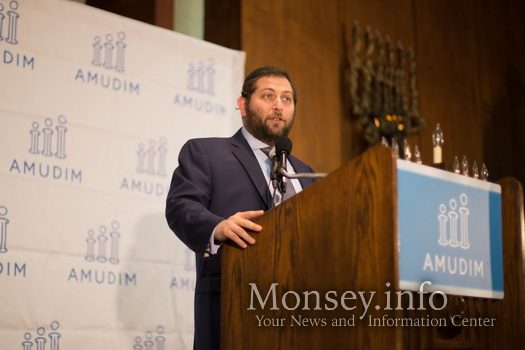
Op-Ed: A Year of Crisis and Response
by Rabbi Zvi Gluck
When you stop and think about it, it’s astounding to realize just how much can happen in a year.
Last year, I wrote a pre-Rosh Hashana message based on the words of U’Nesane Tokef, focusing on the phrase “who by plague” to demonstrate how the pandemic has created a newfound appreciation for the mental anguish that afflicts so many. While COVID’s physical threat has yet to fade away into our collective rearview mirror and its mental health component still looms large, it is encouraging to see that despite its terrible toll, the pandemic has a silver lining, one whose benefits continue to impact our lives in a positive way. Individuals and families are finally feeling comfortable to reach out for help when needed.
From the day Amudim first opened its doors, we spoke out emphatically about the importance of destigmatizing mental health issues, an effort that proved to be an uphill battle. But, having lived through the fear, trauma, and uncertainty of COVID, the world has grown comfortable with the notion that it is okay to not be okay. Baruch Hashem, as a result, so many who are not feeling okay, are seeking the appropriate help and guidance. This reality has given way to another phenomenon, and we have seen time and time again that when an individual is struggling with abuse, addiction or mental health issues, in addition to finding the proper treatment plan and/or appropriate facility, their entire support system is also in need of guidance and assistance. It is critically important to realize that parents, siblings, children and friends of someone experiencing challenges also require assistance.
We are grateful that among those who have reached out to our office since the onset of COVID, have included so many people who have needed help long before the pandemic. Only now since our world was upended, have these individuals felt comfortable seeking the needed help, which was causing them pain for far too long. As we applaud their courage and strength, we know that our collective responsibility is to assist those in need.
Amudim has seen a significant increase in our caseload, which is a clear result of the mental health de-stigmatization. Our call volume has increased to hundreds of calls per day. This illustrates the ongoing need for necessary funding, so that those who seek help, can receive it. What is clear is that several resources must be allocated to meet the growing demand for services, as the need for help will be escalating for the foreseeable future. The reality is that this is in all of our backyards, no matter where we live.
Our reading of Parshas Shoftim just a few weeks ago brought us face to face with the word “Tzedek” – justice. The word Tzedek has many explanations, and the one I am focused on here, is righteousness. This appears three times in the first several pesukim, ending with “Lman Tichyeh”, “so that we can live”. We find another form of the word “Tzedek” which appears in U’Nesane Tokef, with Rabbi Amnon’s emotional tefillah ending with a promise that Tzedakah, coupled with prayer and repentance, has the power to overturn even the harshest of decrees. While many think the definition of the word Tzedakah is charity, the actual definition is righteousness. Being righteous is something that we can all do, whether it’s by showing empathy for someone in pain, providing emotional support, and/or donating for services to aid those in need. These attributes are especially significant with the Yomim Noraim just days away.
The world as we used to know it, is completely different since the global effects of COVID began 18 months ago. But, if we use those experiences to help people in crisis, it is very clear that those acts of kindness, bein adam l’chaveiro, driven by our responsibility to be righteous and live lives of Tzedek, will surely find favor in the eyes of our Creator.
Let us use this opportunity to pray for a healthy year, not only for ourselves and our families, but also for households who are dealing with challenges and in the zechus of such tefillos, may we all be blessed with a year where pain and suffering are replaced by good health (physical/mental) and simcha.
Rabbi Zvi Gluck is the CEO of Amudim, an organization dedicated to helping abuse victims, those struggling with addiction and mental health issues within the community, and has been heavily involved in crisis intervention and management for the past 20 years. For more information go to www.amudim.org.









